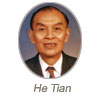AWARDEE OF THCHNOLOGICAL SCIENCES PRIZE
GUO GUANGCAN
Guo Guangcan, an expert on optics and quantum information,was born in Dec.1942 in Huian, Fujian, and graduated from Department of Redio Electronics, University of Science and Technology of China (USTC) in 1965. Now he is the chief president of the Key Laboratory of Quantum Information, professor of Department of Physics of USTC, the president of Chinese Association of Quantum Optics, and the chief scientist of “Quantum Communication and Quantum Information Technology”—National Fundamental Research Program.
Prof. Guo has been devoting himself to the researches on quantum optics, non-linear optics and quantum information. He proposed the principle of probabilistic quantum clone and derived the formula of the maximum probability of clone, which, known as “Duan-Guo probabilistic clone machine” and “Duan-Guo limit”, has become the basis for one of the two different kinds of quantum clone machine. He experimentally realized the two kinds of quantum clone machine—probabilistic and universal quantum clone machine, and then proved the related theorem. He found the existence of “coherence-preserving states” which can protect quantum states from decoherence. Based on this finding, he proposed quantum error avoiding code, which is one of the three different kinds of quantum code, and proven it experimentally. He present a novel quantum information processor, which can effectively reduce the influence of the decoherence in cavities, and realized it experimentally as well. He realized the quantum key distribution (QKD) between two long distant sites experimentally and then accomplished the secure communication system based on quantum cryptography, which can transfer active pictures securely. He also proposed a new encryption scheme. He performed an all-or-nothing-type K-S experiment to verify whether non-contextual hidden variables or quantum mechanics theory is right, and observed that the results strongly agree with quantum mechanics. He explored the interesting characteristic of the odd and even coherent state, etc.






